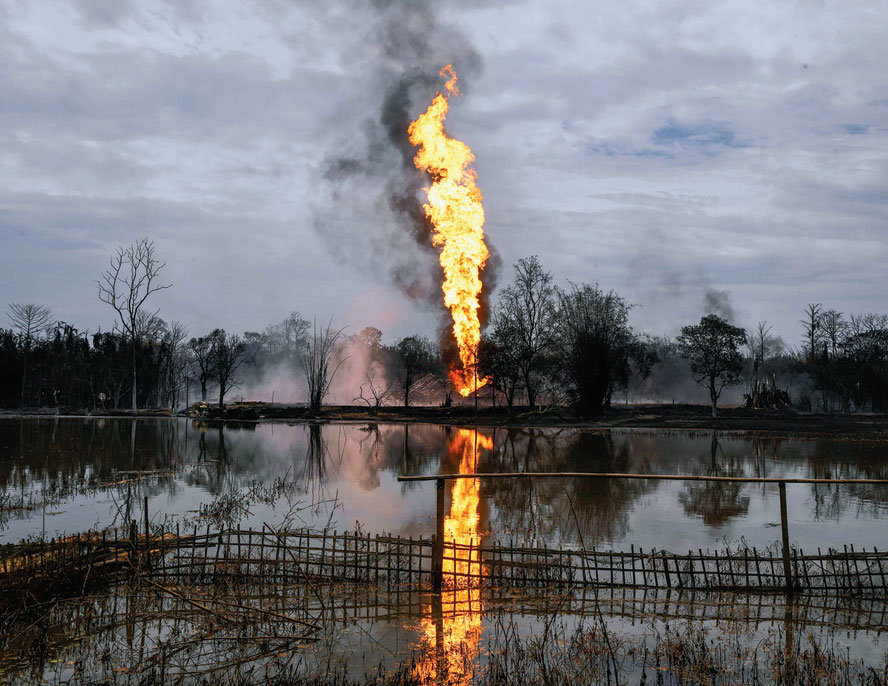A question has been raging along with the oil well fire at Baghjan in Assam in the minds of locals, organisations, activists and even former employees on why Oil India Ltd, an industry major, has to invite global experts to bring blowout incidents under control.
Three experts from Singapore-based Alert Disaster Control were flown here by a chartered flight on Sunday afternoon and they travelled by road to the field headquarters at Duliajan, around 45km from Baghjan. The experts visited the site on Monday morning. The fire broke out on Tuesday afternoon while the blowout started from May 27.
Holding the company and the Centre responsible for the blowout, Baghjan residents Hemanta Moran and Manoj Hazarika said it was really baffling why a team of experts had not been raised to tackle such disasters on a war footing. “We have such a rich history. Oil was first discovered in India in 1889 at Digboi, around 25km from Baghjan, but we still have to invite experts,” Moran said.
Oil India’s Baghjan well was discovered in 2006.
Apurba Ballab Goswami, an environmental activist from Golaghat, has gone a step further by filing an FIR at Baghjan police station, around 530km east of here, seeking action against Oil India and John Energy, which was carrying out work under its supervision, for the extensive damage to life and livelihood.
Goswami, who filed the FIR on Monday, a day before the well caught fire, told The Telegraph on Wednesday, “It is really baffling why such a company does not have a team to kill/douse a well fire? Why foreign experts have to be invited? If they have to be invited, why it took them 12 days? Oil India is a Navaratna company. We should have helped others instead of others helping us.”
Local people have also said the fire posed a threat to the Dibru Saikhowa National Park, about 300 metres from the oil well, and the Maguri-Motapung Beel (wetland), 500 metres away.
Oil India was founded on February 18, 1959, to “expand and develop the newly discovered oil fields of Naharkatia and Moran” in Upper Assam.
A senior Oil India official, who is part of the team handling the blowout, said questions related to safety and efficiency will be raised following a disaster.
“The reaction is quite natural. We appreciate their concern. We also think it would be better to have our own disaster management team but we also need to be practical. Even if we have such teams, it would not be of much help,” he said.
He then cited the reasons why an in-house team won’t deliver results because of limited exposure.
“We can raise a team, give them the best of training and best of equipment. But can they deliver? We have our doubts because they will have limited exposure compared to specialists who are frequently tackling such disasters. We were last confronted with a similar situation in 2005,” the official said.
In 2005, an American company was roped in to cap an oil well blowout at Dikom in neighbouring Dibrugarh district. It took them about 45 days. The official said why it was wise to bring in companies which deal with such situations. “Singapore’s Alert Disaster has successfully tackled around 1,000 blowout incidents in about 135 countries. They have the experience, the expertise and exposure of delivering in all conditions. In times of exigencies, it is better to go with experience,” he said.
An Oil India team or a homegrown team in contrast, according to him, will face the “experience and exposure test” when confronted with such a situation.
“As far as my knowledge goes, no Indian company has such experts. It is also a business call. Business depends on volume. We don’t have the volume. Nobody would invest in a team which will be called out once in 15 years. It will be unfair on the in-house team too because practical knowledge is a must which companies exclusively dealing with such disasters have,” the official said. He said it took some time to fly in the Singaporean experts because of the coronavirus pandemic. “A lot of clearances were required.”











